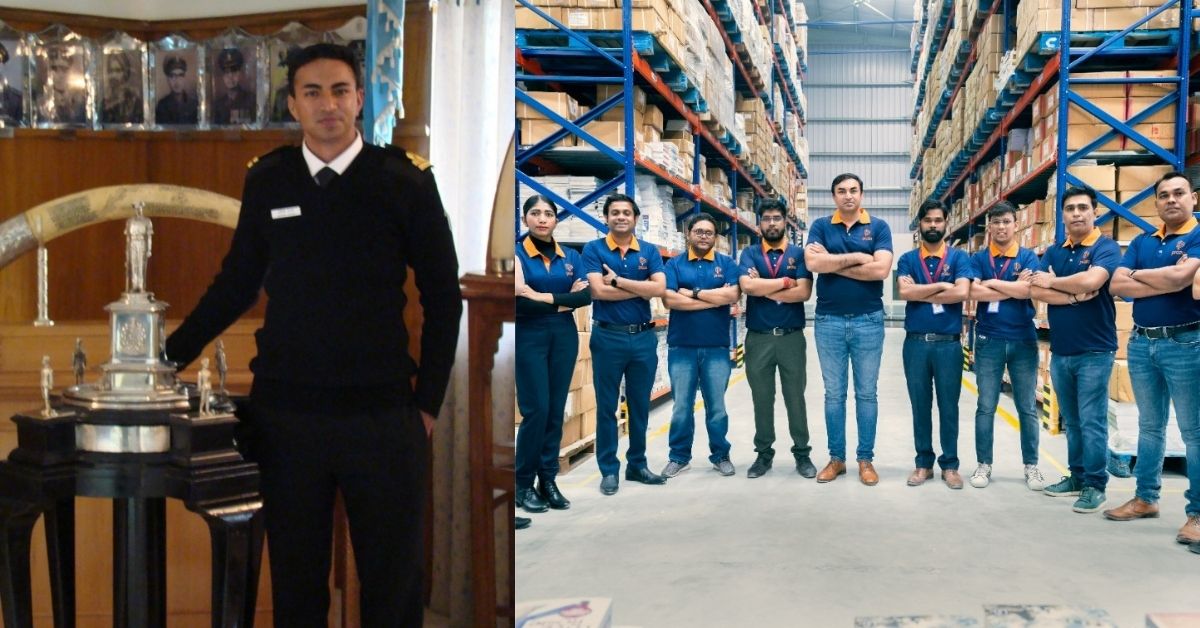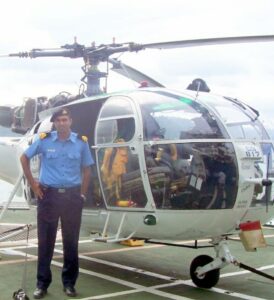Navy Doctor Helps Small Businesses Deliver as Fast as Amazon, Builds Rs 55 Cr Brand
Gurgaon-based Ashvini Jakhar served as a doctor in the Indian Navy for almost seven years before starting his cloud company Prozo. They offer affordable warehousing to small mid-sized enterprises (SMEs).

Before establishing a thriving business in the e-commerce ecosystem, Gurgaon-based Ashivini Jhakar (38) served as a doctor in the Indian Navy for six years.
His work as the lone medical officer at a village in Andaman & Nicobar Islands, during the aftermath of the 2004 Indian Ocean earthquake and tsunami, earned him the prestigious Sainya Seva medal in 2011.
Four years later though, Ashvini founded Prozo, a cloud supply chain company and ‘e-commerce enabler’ that provides small mid-sized enterprises (SMEs), direct to consumer (D2C) brands and enterprises with warehousing, freight and integrated marketplace technology-based solutions.
Based out of Noida, the firm records anywhere between 30,000 and 50,000 business to business (B2B) and business to consumer (B2C) orders every day.
“We’re not like your typical last-mile delivery company. At Prozo, we’re democratising access to warehouses in India. So it doesn’t matter how small a business you have because we help you have the same capabilities as a larger competitor from a supply chain perspective,” Ashivini tells The Better India.
Presently, Prozo has seven warehousing facilities across the country. “Access to our services is possible without spending too much capital or operational infrastructure. With our pay-per-use system, brands pay exactly for what they’re storing at our warehouses. So even if you’re a very small company making, say, Rs 20 lakh of sales per month, you can pay as less as Rs 2 per unit per month of storage,” he says.
As many as 50 SMEs, D2Cs and enterprises avail of this facility at Prozo. “I have always strived to create equal opportunity exposure and in this context, it means enabling brands to place their inventory as close to their consumers. They can then fulfil one to two-day deliveries,” he says.
While it recorded an annual turnover of Rs 25 crore during the last financial year, it is well on its way to achieving its target of Rs 75 crore for 2021-22. “As of this month, we’ve already crossed Rs 55 crore,” he shares.
But under what circumstances did he switch from an illustrious career in the Armed Forces to one in entrepreneurship?

‘Third-generation Army boy’
Ashvini—who presently lives with his parents, his orthodontist-wife and their four-year-old daughter in Gurgaon—was born in Bhurawas village of Haryana’s Jhajjar district. While his mother was a government school teacher, his father was a junior commissioned officer in the Indian Army.
“My grandfather, too, was a junior commissioned officer. Back in those days, India was subservient to the English forces and he had fought on behalf of the UK. You could say I was a third-generation Army boy,” he smiles.
Despite his fascination, Ashivini said he was expected to choose a career as either a doctor, an engineer or in the civil services — as was common in those times.
“So there was always the military influence from my paternal side, but it was my elder sister, who is now a district medical officer in Gurgaon, who exposed me to medicine. By the time I was done with high school, I’d made up my mind to be both an Army officer and a doctor, and was accepted at the Armed Forces Medical College,” he adds.
Following his graduation in 2006, Ashvini received his first posting at Visakhapatnam, Andhra Pradesh, as a Surgeon Sub-Lieutenant. A year-and-a-half later, he was promoted to the rank of Surgeon Lieutenant – equivalent to a Captain rank in the Indian Army — at a deputation with the Indian Coast Guard at Campbell Bay in Andaman & Nicobar Islands, about a two-hour chopper ride from its capital Port Blair.
“The area was fairly dilapidated back then. The nearest tertiary care centre was not drivable by road, so such cases required helicopter or aircraft evacuations — it would take about two to three days to travel by sea. We had a lot of responsibilities in terms of being the last port of medical assistance for a population base of about 10,000,” says Ashvini.
“The senior defence leadership had recently set up a 20-bedded hospital to provide secondary medical care and as the district medical officer, I was the only one in charge,” he explains. “I was supported by a few local paramedics and it was our duty to provide medical care to both defence personnel and civilians in the neighbourhood. Most of the cases we received were related to nutritional deficiencies, skin diseases and substance abuse.”
Two years later, Ashvini received another promotion with a posting in Mumbai. He became a Surgeon Lieutenant Commander, equivalent to the Major rank in the Indian Army. As the medical officer in charge at the Colaba helicopter base, he played an instrumental role in attending to the casualties at the Taj and Oberoi hotels during the 2008 terrorist attacks.
Despite the meaning that these experiences brought to Ashvini’s life, he says that he foresaw a halt in his medical ambition at the Navy. During his school days, Ashivini had incurred injuries that required him to undergo two operations on his right knee.
While he had managed a spot in the Navy regardless, he said he couldn’t risk becoming a care-receiver himself. “The Army’s definition of fitness is very different from everybody else’s. There are instances when doctors have to run down their ships’ aisles to evacuate people, or even carry the stretchers themselves,” he explains, adding that he didn’t want to continue down this path.

‘Master of my Destiny’
Following his exit from the Indian Navy in late 2011, Ashvini says he didn’t want to opt for the obvious routes of setting up a personal practice or joining a pharmaceutical company. He qualified for the GMAT and joined the Indian School of Business (ISB) in Mohali, Chandigarh.
“I didn’t know whether my life experiences were relevant or sufficient, but I went in with an open mind to explore my options. The ISB had an extremely diverse cohort, and some people had far more work experience than I did. These included athletes, NGO founders, architects, designers, doctors, police officers and former personnel of the Armed Forces. With a familiar peer group to brainstorm with, things became much easier,” he says.
Soon after his graduation, Ashvini landed a Delhi-based profile at McKinsey & Company. It was here that he had the opportunity to interact with promoters of firms, eventually discovering his passionate intent to pursue entrepreneurship.
“These were people who could independently take the shots for things that they believed in. It was a total state of empowerment; they were the masters of their destiny. I knew I wanted to be one of them,” he says.
While Prozo began as a bootstrapped venture with 25-odd employees, its organisational strength now stands at 170 members. They work with brands such as Lavie, McGraw Hill, Winmagic and Pee Safe.
“If a brand sees the e-commerce space as an opportunity or a pain point, we help them achieve their full potential. Typically, founders face a lot of resistance when they begin their operations, whether it’s in terms of finding warehouse spaces, signing lease agreements, or fulfilling minimum business guarantees. But at Prozo, they get access to pan-Indian warehousing facilities without these hassles,” he says.
He adds, “Our warehouses have fast-delivery badges of ‘Amazon-Prime’ and ‘Flipkart-Assured’, so even brands associated with them can store their inventory at our warehouses. But for those who aren’t, we offer them our network of seller-platforms that fulfil both B2B and B2C orders.”
Ashvini points out that the origins of his ‘contextual leadership’ are from his time in the Navy.
“I know when to be in the line of fire, and also when to take the backstage and have my team bask in the limelight. I can be a micromanager and also a 10-feet kind of boss,“ he says. “Prozo’s capabilities are opportunities for companies, and we want to continue providing exposure to SMEs and D2C brands. In the next three years, we want to help 10,000 companies achieve their e-commerce objectives.“
For further information on Prozo, you can visit its website.
Edited by Yoshita Rao
If you found our stories insightful, informative, or even just enjoyable, we invite you to consider making a voluntary payment to support the work we do at The Better India. Your contribution helps us continue producing quality content that educates, inspires, and drives positive change.
Choose one of the payment options below for your contribution-
By paying for the stories you value, you directly contribute to sustaining our efforts focused on making a difference in the world. Together, let’s ensure that impactful stories continue to be told and shared, enriching lives and communities alike.
Thank you for your support. Here are some frequently asked questions you might find helpful to know why you are contributing?


This story made me
-
97
-
121
-
89
-
167











